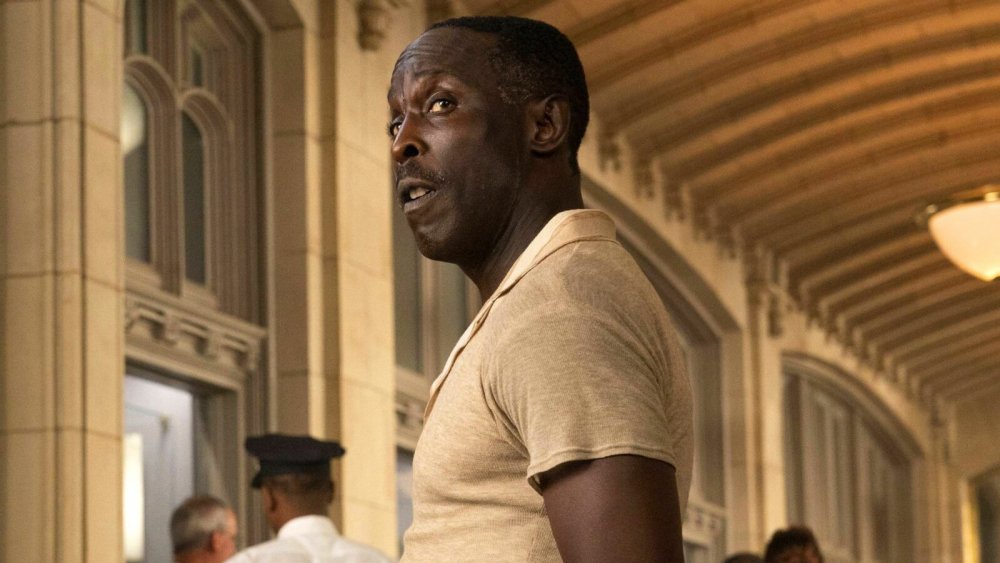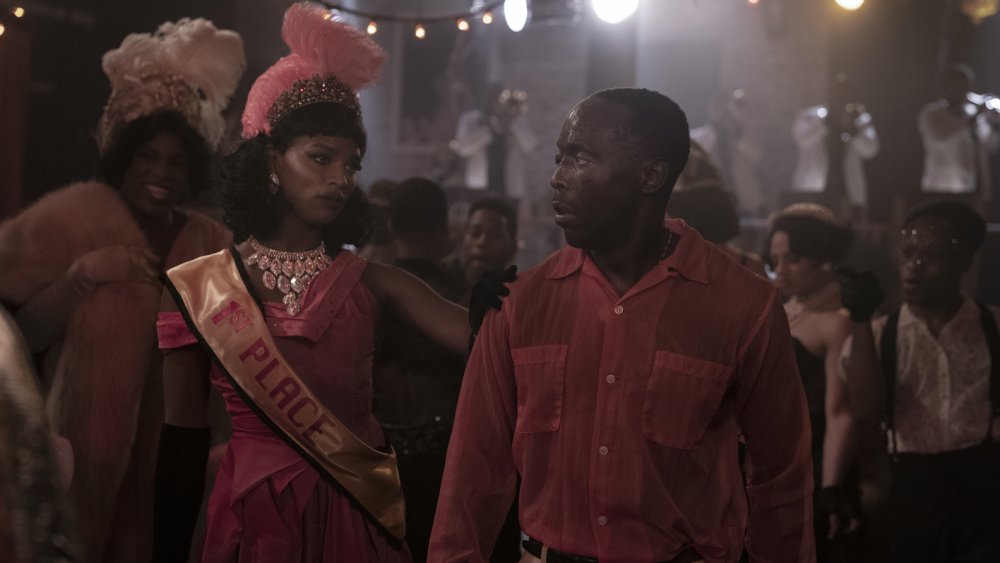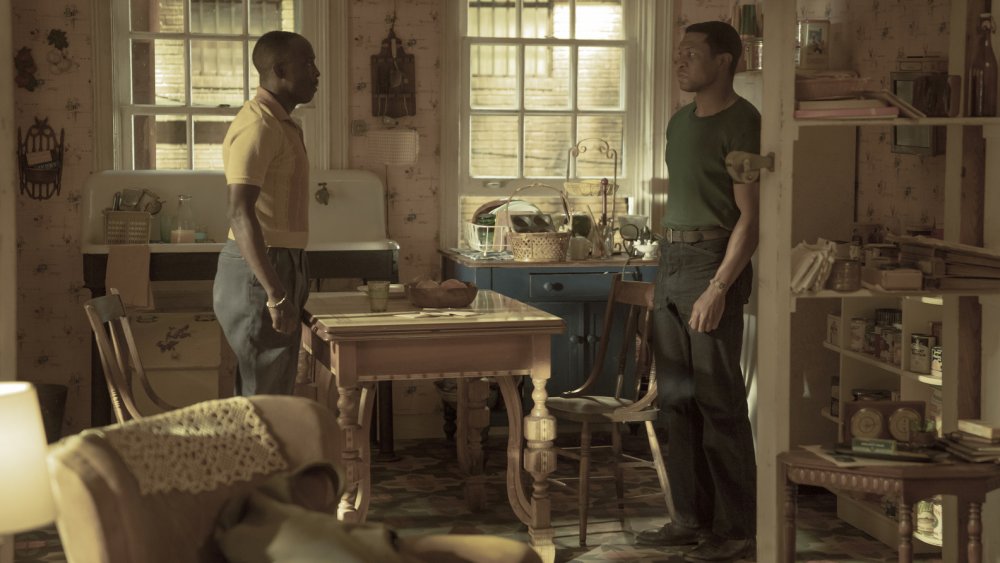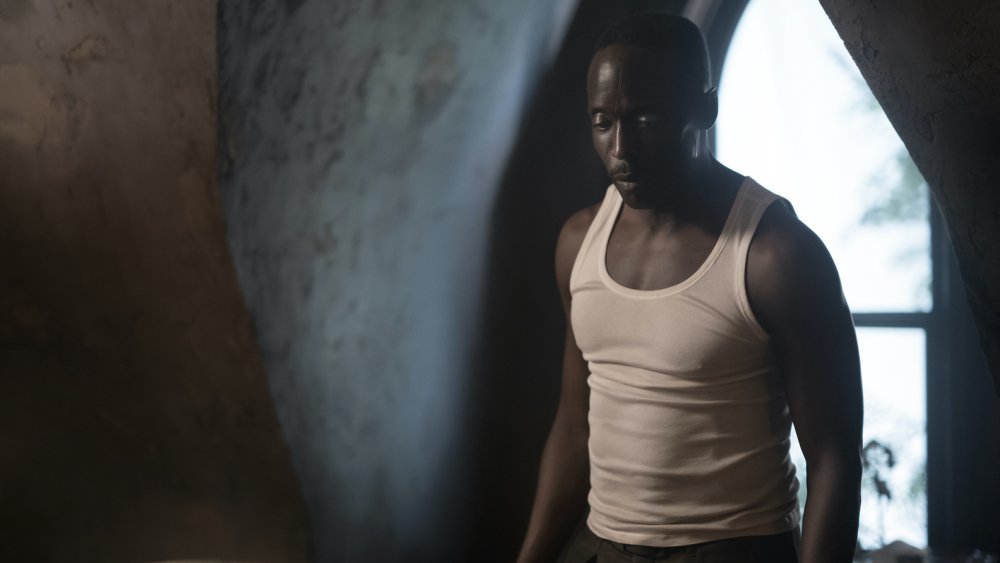Michael K. Williams Talks Lovecraft Country Season 1 - Interview
As we inch closer to the looming season finale of Lovecraft Country, the show's pace is picking up accordingly. If magical cults, multi-eyed behemoths, vengeful ghosts, and shapeshifters weren't already enough for you, episode 7 ( titled "I Am") upped the ante and introduced even more cosmic craziness. Thanks to some inter-dimensional portal contraption, Hippolyta (Aunjanue Ellis) went on a retro sci-fi-fueled journey through space and time complete with afro-puffed fembots from the future.
Episode 8 ("Jig-a-Bobo") goes full-on horror mode and focuses on a death curse that looks like a spin on what It Follows might have looked like if Jordan Peele directed it. In this episode, poor little Diana (Jada Harris) is relentlessly pursued by a pair of demonic twin girls not long after a cultist police officer marks her with a curse. It seems the evil twin manifestations took on the form of a twisted version of the Topsy character seen on the cover of Diana's old Uncle Tom's Cabin book. Sporting raggedy gunny sack dresses, freaky yellow eyes, and Freddy Krueger-esque fingernails, they stalk her throughout the entire episode — and no one can see them but her. Their twitchy movements, malicious smiles, contortionist poses, and taunting dances are downright creepy.
These two episodes also shine a spotlight on the deep secrets carried by one of the show's most misunderstood characters: Montrose, the emotionally abusive and headstrong father of lead hero Atticus Freeman (Jonathan Majors). In "I Am," Atticus learns a hard-hitting truth about his father. Montrose is a closeted gay man in an intimate relationship with Sammy, a local bartender and drag queen. During an unannounced visit to his father's home, Atticus runs into the truth head-on. Montrose is caught off guard during a heated lover's spat right outside his front door — it's clear what's going on, and it hits Atticus like a ton of bricks.
With tears streaming from his eyes, Atticus storms away and suddenly understands why his father was abusive to him all his life — perhaps he wanted to beat the softness out of him, something likely sparked by his own internalized homophobia. It's a heartbreaking moment, but the two eventually lay it all out on the table and Montrose, for the first time, fully opens up to his son. He tells Atticus about a haunting story from his youth. A local pastor was caught having an intimate moment with another man in a parking lot. One day, during a Sunday service, he was hauled away by police as if he was some "perverted demon." Word got out that he was thrown into an asylum and lobotomized. As Montrose tells Atticus, "I chose life over a damn asylum."
He makes it clear that, while their relationship was never romantic, he never cheated on Atticus' mother — he had the impulses, but never acted on them until after her death, and all he ever truly wanted was a family. It's the beautiful, long-awaited father and son moment we've been hoping for, and it's only elevated more by the emotional performance by Michael K. Williams, who plays Montrose.
During a roundtable interview, Looper was able to talk to Williams about what it was like peeling back all those layers on such an emotionally complex and misunderstood character. He also shared his views on generational curses, his thoughts on controversial American author H.P. Lovecraft, and what he hopes audiences take away from Lovecraft Country.
Montrose is coming to terms with his sexuality
Montrose is very complex, and throughout most of the season, he's clearly hiding a lot from Atticus. What do you think Montrose fears the most about Atticus finding out the truth?
That's a very good question. I mean, for obvious reasons, he thinks that the magic is no good. I truly believed that Montrose thinks anything related to this magical lineage that his mother has is no good. I also think it's a bit of a power struggle. With knowledge comes power. We know who we are, we know who we are, and I don't know, maybe there's a bit of a fear of losing control of the status quo, changing within a relationship, which I believe ultimately happens anyway.
Montrose has a tendency to withhold things from Atticus, which was really interesting to me because I feel like it also joined in line with his struggles around accepting his sexuality and being able to be fully unrepressed in who he is. As you were playing the character were you finding threads between those two sorts of running themes? Was that something you tried to play up throughout the narrative?
I think a lot of the reason why he hid things from Atticus — one, I think there was definitely a part of him that felt he was protecting his family, and his son from this darkness. And two, it was a power trip. It was, "I know it's best for you. You listen to me." Everything Atticus did, if it wasn't sanctioned by Montrose, Montrose didn't think it was a good idea. Like, the books Atticus read and going the army. Atticus always wanted to know more about his mother, but his father said "No, leave it alone." So that was so odd about the letter that Atticus got from Montrose saying, "You've got to know your lineage." He's like, "You always said don't do this."
So that was definitely there. And I don't know in regards to his sexuality, his acceptance or un-acceptance of his sexuality, if that had any play in that part of their relationship. It did have a lot to play with the beatings — the physical beatings and the beating down emotionally. In some weird way Montrose wanted to beat all the softness out of Atticus, because he did not want him to suffer the way he did. But in his fight to do that he was the main one that abused Atticus.
Generational curses are real
You can see in so much of Montrose's dynamic with Atticus. As unsupportive and at times abusive as he is, it's all born from this place of twisted love and this fundamental desire to do what he thinks is best for his son. In a way, that really speaks to the fact that Montrose never really had anyone going to bat for him. In your mind, what is it that you think Montrose really needs to do this sort of deep kind of healing? That would be one of the only really solid paths forward for him to grow emotionally, both for himself and with Atticus.
I would dare say he would need to start with forgiveness. Forgiveness for himself. He needs to forgive himself and know that he did the best he could with what he had. It needs to be a forgiveness to his father. George and Montrose's father was very abusive because of their softness. Montrose has these generational curses that we all suffer from. Everyone. This is real. That's real life. You know, that's not just a character trait. Generational curses are real. We pass them down. We pass down the trauma as well as the family recipes, the legacies. And so when somebody makes the decision to say "I'm going to break this cycle now," the first thing would be to go to a therapist or whatever works. He probably would need a sponsor too with the alcohol, he's heavy on the booze. But yeah, it would start with forgiveness. Forgiveness for his father because God only knows what his father dealt with before passing that on to him. And the third thing and most important is communication, which we see happen. There's a conversation between Montrose and Atticus. You could do this after this journey, we see Atticus become a man, basically.
We think he's a man when he comes home from the army, but he's immediately reduced to tears the first time he catches up with his father. So we watch him grow up and become not just a man, but his own man. And they have this conversation, I don't even know what episode or what scenes, it's so blurry, but I remember the conversation, and Montrose tells him the truth. The truth about himself, and most importantly, the truth about the love and the type of relationship that he and Montrose's mother shared. And to me, that was so healing. It was such a beautiful scene, and the dialogue, and the way Montrose spoke to his son with such respect and honesty. And to me, those are the tools that one needs to move on.
Lovecraft Country is a piece of art that can be held up as a mirror
You were in The Wire, 12 Years a Slave, and When They See Us — all three projects were massively influential in how they instigated a debate on race in America. And so with the current political climate, I was wondering what elements of those three do you see in Lovecraft Country in how it addresses race in America and how it will instigate hopefully a debate over that?
I think that Lovecraft Country, the fact that we have this piece of art to hold up as a mirror, for us to look at ourselves as a nation, I think is such a gift. I think that Lovecraft Country serves as a glimpse to the timeline of a series of events of things that happened that led us to where we're at today.
People often ask would [writer-producer] David Simon ever make a season six of The Wire, and I would repeat what he always said. He did make a season six. He just made it season five. When you said what you had to say, let's look at the issues that this show's dealt with and now try to sensationalize it because anything else after season five, it would have been making a show for a different reason. When we look at shows like The Wire and now Lovecraft Country, and we get a chance to show what is wrong with us as a society and as a community. I think it's always a good time to tell stories like that. Entertainment in Hollywood, of course it's good to tell things about love, fantasy and escapism. It's Hollywood, right? However, it's also a very important tool. A lot of us in society take our cues from certain pieces of art and it connects us.
There are people who never even knew that there was a Tulsa massacre — black and white — and now they get a chance to be educated with shows like Lovecraft Country and Watchmen and hopefully go and educate themselves even further beyond the television show or the film to really find out what happened. And that's a beautiful thing. That's a great way to use art. And even giving props, I guess if you will, to H.P. Lovecraft, from what I hear about the type of person he was, I would probably render him a very sick and sad individual. However, he was able to take his hurt and pain or his ignorance, if you will, and turn it into a piece of art that we're able to regurgitate and turn into another piece of art. That's a beautiful thing, and that's life.
What's the one thing you hope audiences learn or take away from Lovecraft Country? Especially fathers and sons or men who are coming to terms with their sexuality later in life?
You know, in regards to black men, particularly our sexuality and how we're viewed and how we're not able to be soft or vulnerable within our intimate spaces. I hope that Lovecraft Country will at least start the dialogue as to what that looks like. In regards to the show as a whole, I would hope that the audience would walk away with some knowledge and some empathy and just a willingness to listen to each other a little bit more.
With all the great storytelling and the social narratives that you're going to be getting throughout the season, the foundation of this story is a family story. They're looking for their legacy, going through the typical things that families go through: the arguments, the coming together, the finding love, the forgiveness, the basic things that all families deal with. This is what this family is dealing with, and I hope that the audiences walk away with a certain sameness, a certain identity that they may or may not have had prior to watching. If I could just reach out a little bit more, if there's a family that doesn't look like mine, that doesn't know my experience as a Black man in America, I would hope that they would watch this and find a little bit more of an understanding as to how and why things got the way that they did.



